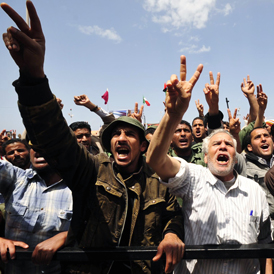Libya: NATO dismisses Gaddafi’s offer of talks
Gaddafi offers a ceasefire provided NATO stop aerial bombardment – but refuses to give up power as fighting continues. Alex Thomson reports from Misrata on the desperate struggle to save lives.
Colonel Gaddafi said on Saturday he was ready for negotiations provided NATO “stop its planes”, but refused to stand down from power as rebel forces and Western powers demand.
NATO and Libyan insurgents rejected Gaddafi’s offer, saying he had lost credibility and the time for compromise had passed.
“We need to see actions, not words,” a NATO official said.
“NATO will continue operations until all attacks and threats against civilians have ceased, until all of Gaddafi’s forces have returned to base and until there is a full, safe and unhindered humanitarian access to all people in need of assistance.”
Weeks of Western air strikes have failed to dislodge the Libyan leader, instead imposing a stalemate on a war Gaddafi looked to have been winning, with government forces held at bay in the east and around the besieged city of Misrata while fighting for control of the western mountains.

With neither side apparently able to gain the upper hand, Gaddafi struck a more conciliatory tone in an 80-minute televised address to the nation in the early hours of Saturday.
“(Libya) is ready until now to enter a ceasefire,” said Gaddafi, speaking from behind a desk and aided by reams of paper covered in what appeared to be hand-written notes.
“We were the first to welcome a ceasefire and we were the first to accept a ceasefire … but the Crusader NATO attack has not stopped,” he said. “The gate to peace is open.”
Gaddafi denied mass attacks on civilians and challenged NATO to find him 1,000 people who had been killed in the conflict.
As he spoke, NATO warplanes hit three targets close to the television building in Tripoli in what state media said was an attempt to kill Gaddafi who has ruled Libya for 41 years.
The air strikes left a large crater outside the attorney general’s office but did not damage the building and hit two other government offices housed in colonial-era buildings. It was not immediately clear if there were any casualties.
Misrata sea mines planted
While Gaddafi vowed never to leave his country his forces claimed to have captured the port of the city of Misrata on Friday, the last major rebel outpost in western Libya, but NATO said it saw no evidence of that.
Trapped in Misrata, Alex Thomson blogs
It is mines. Sea mines. They are conducting some kind of big search operation after The Colonel's lads were caught out by NATO In the shipping lanes sinking inflatables with sea-mines aboard.
Not a very sporting.
Because several hundred African migrant workers - mostly illegal immigrants tacitly allowed in by Tripoli but without any passports - are sitting in the horrible dust and wind around the port waiting to get out. They have been shelled and they are getting a little desperate and no wonder. These, the last few hundred of several thousand congregated in camps around the port area.
They badly need the boat out - the only way they are getting back to Ghana, Niger and Chad.
Click here to read the full blog from Alex Thomson in Misrata
Libya’s government has threatened to attack any ships approaching Misrata, potentially depriving insurgents of a lifeline to their heartland in the east of the country.
NATO said Gaddafi forces had laid mines on the approach to the harbour, which has been under siege for weeks, and forced a temporary halt in humanitarian shipments.
“NATO forces are now actively engaged in countering the mine threat to ensure the flow of aid continues,” the alliance said.
Further west, the war spilled into Tunisia when Gaddafi’s forces overran a rebel enclave at the frontier. The Libyan army shelled the Tunisian border town of Dehiba, damaging buildings and wounding at least one person, witnesses said. They said Libyan soldiers drove into the town in a truck chasing rebels.
Tunisian Deputy Foreign Minister Radhouane Nouicer, speaking on Al Jazeera television, said casualties, including a young girl, were inflicted when the conflict spilled over on Friday.
“We summoned the Libyan envoy and gave him a strong protest because we won’t tolerate any repetition of such violations. Tunisian soil is a red line,” he said.